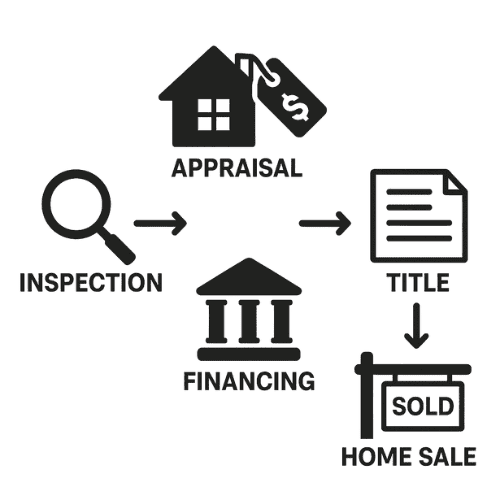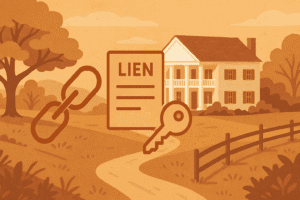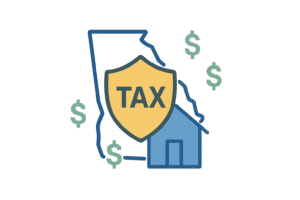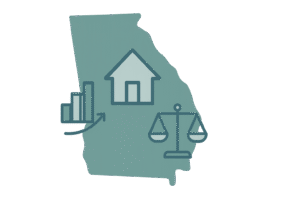Georgia Real Estate Contract Basics Explained (2025)
This article is for informational purposes only and is not a substitute for professional legal advice. Consult a qualified attorney or real estate professional for…

Why Understanding Your Georgia Real Estate Contract is Crucial
Georgia real estate contracts are more than just paperwork; they’re legally binding agreements that can make or break your residential property purchase. Imagine this: You’ve found your dream home in Georgia, ready to sign, but a small detail about earnest money could cost you thousands if the deal falters. This happens more often than you’d think. These contracts carefully outline responsibilities, timelines, and financial terms for buyers and sellers. Understanding them is vital to avoid losing deposits, facing lawsuits, or missing your move-in day. The year 2025 brings significant changes, driven by updates to the Georgia Association of REALTORS (GAR) forms and the National Association of Realtors (NAR) settlement, which reshape agent compensation and require clearer written agreements.
So, why is understanding this legal document so vital? Making a mistake can lead to losing your deposit, facing lawsuits, or, even worse, seeing your move-in day dream disappear. The year 2025 brings some big changes, mostly because of updates from the (GAR) forms and a major legal decision called the National Association of Realtors (NAR) settlement.
This settlement has changed how real estate agents are paid, requiring clearer written agreements between buyers and their agents and shifting certain costs. Sellers, you might not automatically pay for the buyer’s agent fees anymore. Buyers, you’ll now need a written agreement with your agent right from the start. These adjustments aim to make things fairer and more transparent, but they also add new steps that need your attention. I’ve seen firsthand how overlooking these details can cause a lot of stress. A thorough understanding empowers you to navigate Georgia’s real estate market confidently, helping you avoid pitfalls that often catch people off guard.

What Makes a Georgia Real Estate Contract Legally Solid?
Now, let’s talk about the basic parts. What turns a document into something that can be enforced in a Georgia courtroom? From years of experience, these core elements decide if a contractual agreement is truly valid. The absence of even one piece can lead to major problems.
The 4 Must-Haves for a Valid Contract
- 1. Mutual Agreement (Offer and Acceptance): It Takes Two to Agree It all begins with mutual agreement, meaning both parties clearly say “yes” to the exact same terms. Usually, the buyer makes an offer using a residential purchase agreement (a legal form), often prepared with help from a real estate agent. The seller then accepts by signing, sometimes after some back-and-forth talks. For example, if a buyer thought a verbal change was enough, they might learn that state law requires everything to be in writing. Agents are key here, helping offers go smoothly and making sure there’s a clear “meeting of the minds,” which is essential for an enforceable real estate purchase agreement.
- 2. Consideration (The Purchase Price & Beyond): What’s Being Exchanged? Next is consideration, which simply means that something valuable is exchanged. In real estate, this is typically the purchase price—the money or financing the buyer provides for the current property. But it can also include other valuable things, like the seller agreeing to leave certain appliances. Sometimes, even a lower offer is accepted because the consideration includes something like the seller getting help with relocation. Without clear consideration, the contractual agreement lacks legal effect.
- 3. Legal Purpose and Competent Parties: Who Can Sign? The deal must have a legal purpose. Contracts for illegal activities are not enforceable in Georgia. Also, everyone involved must be competent parties: adults who are of sound mind, not minors or people being forced into the agreement. For instance, if a seller seemed confused, it would be important to pause the process to confirm their legal capacity, preventing a potential problem later on. This early identification, though sometimes frustrating, is a significant achievement.
- 4. It Must Be Written (The “Write It Down” Rule): Why Verbal Promises Don’t Count. Georgia law is very clear on this: the Statute of Frauds requires that real estate sales contracts must be in writing to be enforceable. Oral agreements are just not upheld in court. This legal requirement, designed to prevent fraud, has for centuries protected parties from “he said, she said” arguments. It’s always best to rely on formal, signed contract forms. For context, under O.C.G.A. § 13-5-30, any promise to transfer land or agreements that can’t be completed within one year must be in writing and signed by the person who is bound by the agreement. When these elements are properly aligned, your legally binding contract is as solid as Georgia granite.

Understanding the Georgia Purchase and Sale Agreement (GAR Form F201)
The GAR Purchase and Sale Agreement (Form F201) is the standard template for most Georgia residential property transactions in 2025. Think of it as the main blueprint for your deal. It’s very detailed, but manageable with expert guidance from real estate professionals. This form evolves, but its fundamental principles stay the same. Let’s explore its key sections.
Key Sections You’ll See
- Property Description and Sale Price: Knowing What You’re Buying. First, the contract needs a super clear description of property. This includes the street address, lot size, and the legal description of the property found in the deed, like the parcel identification number and property boundaries. Missing details here can lead to big problems. The sale price comes next, along with specific payment terms, including the down payment amount or the types of financing involved. It’s always smart to verify the detailed description of the property with a survey.
- Earnest Money Deposits: Showing You’re Serious. Earnest money shows the buyer’s serious intent to purchase. It’s a deposit, typically 1-3% of the purchase price. It’s held by a neutral third party, like a brokerage firm or a closing attorney. If the deal closes successfully, this money is credited towards the purchase price. However, if the deal falls through due to the buyer backing out without a valid reason, the seller may be entitled to keep it. While 1-3% is common, in competitive markets, deposits can reach 5-10%, and they are often held in escrow by the closing attorney or broker. This serves as vital protection for both the property owner and the buyer.
- Closing Date and Possession: When Do You Get the Keys? The closing date is when funds and the title officially transfer, usually 30-45 days out, though up to 60 days in some cases. Possession of the residential property typically transfers on this date, though extensions can happen for valid reasons. For 2025, GAR has updated this: extension notices must now be given by 8 p.m. on the closing day, not midnight, making the final moments of a transaction smoother.
- Financing Contingency: Your Financial Safety Net. This clause is a very important safeguard, allowing buyers to back out of the contract and get their earnest money back if they can’t secure the necessary loan. This protects against the buyer’s inability to secure funds. It’s crucial to specify the loan type and timeline; vague clauses can lead to a lot of frustration if lenders are slow. This remains a crucial protection, especially with fluctuating interest rates.
- Due Diligence Period: Your Time to Investigate. Typically, this period lasts 7-14 days, letting the buyer do home inspections, appraisals, and thorough research on the property. It’s vital to use this time wisely: arrange for professional home inspections to find any known defects and carefully review homeowners association (HOA) rules. Since Georgia is a “caveat emptor” (buyer beware) state, sellers aren’t required to disclose every minor issue, making your own investigation extremely important. For instance, discovering significant termite damage during this period can lead to negotiation for repairs, turning a potential crisis into a fair contractual agreement.
- Disclosure Forms: Ensuring Transparency. Sellers are usually required to provide a seller’s property disclosure statement detailing known defects, like a leaky roof, not just minor cosmetic issues. For homes built before 1978, lead paint disclosure is required by federal laws. Testing is always recommended, especially if children will live in the home. However, remember that Georgia operates under the “buyer beware” principle, making independent inspections critical. While Georgia does not mandate a specific formal disclosure form, sellers must disclose known defects that aren’t easily seen, and GAR provides optional forms for this purpose.
- Other Common Contractual Terms. It’s also important to look at clauses like survival clauses (where certain terms stay in effect after closing), rules for attorney fees for the winning side in disputes, and necessary homeowners association (HOA) approvals. The negotiation phase is where these terms are finalized. For 2025, GAR has added new requirements for the property to be in a “clean condition” even for “as-is” sales, and now prevents recording the real estate purchase agreement to avoid title issues. It’s wise to adjust these terms to fit your specific situation.
Why Contingencies are Your Best Friends in a Georgia Contract
Contingencies act as critical safety valves in your legally binding contract, allowing you to back out without significant loss if specific conditions aren’t met. These clauses have prevented countless difficulties, even if they sometimes frustrate sellers. Still, they are incredibly important in Georgia’s real estate market.
Common Contingency Clauses Explained
- Inspection Contingency: This gives buyers enough time to get a professional home inspection to find any defects. If major issues pop up, you have the option to negotiate repairs or end the contract. This clause can lead to successful outcomes, like a buyer finding foundation cracks and getting seller credits—a truly beneficial result.
- Appraisal Contingency: If the property’s appraised value is lower than the price you agreed on, this contingency protects you from paying too much. Since the lender won’t finance the difference, you can then renegotiate the price or end the agreement. It ensures fairness, especially if property values are changing.
- Financing Contingency: If you can’t get the loan despite your best efforts, this clause ensures you aren’t forced to buy the property. With fluctuating interest rates in 2025, this remains a crucial protection for the buyer’s best interest.
- Title Contingency: An attorney performs a title search to find any liens, boundary disputes, or other claims affecting the property. Title insurance offers protection against unexpected claims. A clear title ensures a smooth transfer of ownership—it’s a significant achievement when complex title issues are resolved for a property owner.
- Home Sale Contingency (if applicable for Buyer): If buying your new home depends on selling your current property, this contingency connects the two deals. While some sellers might not like this because of the risk of a chain reaction of cancellations, it’s often essential for buyers in this situation.

Your Support Team: Real Estate Agents and Attorneys
You don’t navigate a real estate transaction alone. Real estate agents and attorneys are your essential allies. Their roles are distinct yet work together perfectly.
The Real Estate Agent’s Role (Especially with New 2025 Rules)
Under Georgia’s Brokerage Relationships in Real Estate Transactions Act (BRRETA), agents handle offers, provide disclosures, and ensure regulatory compliance. They are tasked with presenting terms fairly and disclosing any relationships relevant to the transaction. For 2025, the NAR settlement brings new buyer brokerage agreements (formal written agreements detailing the services provided and their compensation). Buyers will often be responsible for these fees unless negotiated otherwise with the seller. New GAR real estate forms, such as F110 (an exclusive right to represent the buyer) and F116 (notice for unrepresented buyers), are now in effect. Any seller contribution will directly lower the buyer’s stated compensation. The main goal is to separate commissions and make things more straightforward. BRRETA defines relationships like client, customer, and dual agency, requiring written disclosures to avoid conflicts, always keeping the parties’ best interests in mind. Agents often work as independent contractors for a brokerage firm.
The Real Estate Attorney’s Essential Role: Your Legal Shield
As a closing professional, my responsibilities include reviewing real estate purchase agreements, managing the title process, and overseeing the distribution of funds. We identify potential legal risks and provide advice on intricate clauses. For complex transactions, getting legal representation from a law firm is always recommended; we serve not as agents, but as vital legal safeguards. Errors that could cost thousands can be identified and corrected, which is a truly rewarding experience. It is always advisable to seek legal counsel early in the process for any type of legal contract.
What Happens When a Georgia Real Estate Contract Goes Wrong?
A contract breach is a difficult situation in which one party fails to fulfill its contractual obligations, harming the other. Let’s examine the available solutions.
Understanding Default and What Happens Next
- Buyer’s Default: Losing Your Earnest Money. If a buyer backs out of the contract without a valid reason, the seller typically keeps the earnest money as a form of liquidated damages. While this can be a tough consequence, it’s a standard provision. This is the possible reason for a buyer to lose their earnest money.
- Seller’s Default: Taking Legal Action. If a seller refuses to close the transaction, the buyer can take legal action, either seeking “specific performance” (a court order forcing the sale) or monetary damages. While rare, achieving a successful outcome in such a case can be a significant triumph for the buyer, asserting their legal right.
- Dispute Resolution: Trying to Fix Things Before Court. Contracts often require mediation or arbitration as initial steps before going to court. The consequences of a breach can include substantial legal fees and a lot of stress. The most effective way to prevent these issues is through clear and well-defined terms of the agreement right from the start.
Key 2025 Updates to Georgia Real Estate Contracts (GAR Forms)
The year 2025 has brought significant changes, mainly because of the NAR settlement, which requires more transparency in how real estate agents are paid. In response, GAR has updated its real estate forms, an exciting development for transparency that requires careful adaptation.
- Impact of the NAR Settlement on Buyer Broker Agreements. The NAR settlement now requires written agreements before agents can even show properties. Buyers might be responsible for their agent’s fees unless the seller contributes. New GAR forms, such as F116 (non-exclusive buyer broker agreements for customer work) and F117 (notice for unrepresented buyers), are now in effect. Any seller contribution will directly reduce the buyer’s stated compensation. The overall goal is to separate commissions and make things more straightforward, ensuring fairness for both the property owner and the buyer.
- Important Revisions to the GAR Purchase and Sale Agreement (F201). Key modifications include:
- A prohibition against recording the agreement to prevent title issues.
- New requirements for the property to be delivered in a “clean condition,” even for “as-is” sales.
- Clarifications regarding lease agreements. A sale does not automatically end existing lease agreements.
- Provisions for emergency extensions in cases of state declarations.
- A shorter time limit for broker claims. These updates are designed to clarify contractual obligations and enhance protections for all parties involved in a real estate purchase agreement.
- Other Notable GAR Form Updates. Seller listing agreements now include NAR waivers. Temporary occupancy agreements feature clarified lease terms. Overall, the contract forms continue to evolve to reflect current market dynamics and legal framework. Remember, this information is for informational purposes only. Always consult with real estate professionals for specific guidance. The Georgia Real Estate Commission oversees many of these regulations on a regular basis.

Essential Tips for Navigating Georgia Real Estate Contracts
Here are some key insights to help ensure a smooth real estate transaction:
- Read Every Word Carefully: No Skipping! Thoroughly review the entire agreement. Every clause and even the restrictive covenants are significant. This is an important decision.
- Don’t Hesitate to Ask Questions: Your Agent and Attorney Are There to Help. Always consult your agent and attorney; it’s always better to be fully informed. Make sure you have their contact information.
- Understand Time Frames and Deadlines: Don’t Miss Out! Missing a deadline can jeopardize the entire deal. Keep them clearly calendared, noting the expiration date for various contingencies.
- Prioritize Inspections and Due Diligence: Look Before You Leap. Uncover any potential defects or issues with the current property early in the process. The home inspection is crucial.
- Seek Professional Legal Advice: Always Get an Expert Opinion. Always, without exception, your future self will appreciate it. Building a strong attorney-client relationship is key for successful real estate investments.
Conclusion: Your Confident Path Through Georgia Real Estate Contracts
In summary, mastering Georgia real estate sales contracts gives you a distinct advantage. While they can be complex, equipped with the right knowledge and supported by a reliable agent and attorney, you can successfully navigate your transaction.
Staying informed about current laws and real estate forms is crucial for making informed decisions in Georgia real estate. Proceed with confidence towards your real estate goals.





